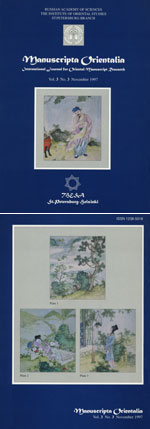|
|
| |

|

|
Klyashtorny S. About One Khazar Title in Ibn Faḍlān // Manuscripta Orientalia. Vol. 3. No. 3. November 1997. P. 22—23.
Ibn Fadlan, an Arab author well informed about Khazaria, while describing its political system after his visit to the Khazarian capital Itil in 922, names (after the sacral ruler, the great Khaqan, or Qagan) only three high-ranking officials of the state. According to Ibn Fadlan, these three, “being the deputies”, the author says, of each other in hierarchical succession, are (i) Khaqan Век (Qagan Beg) actually ruling over the country; (ii) Ktindur Qagan; and (iii) javsigar (?). The Arab author says nothing about the functions the last two performed in the state. Both Kundtir Qagan and javsigar are mentioned in the final section of the famous Book of Ibn Fadlan, which is missing in the unique Meshhed manuscript of this writing but present in the Mu'jam al-buldan by Yaqflt who abundantly cites Ibn Fadlan's work.
The word ktindur (kundur), after numerous unsuccessful attempts to determine its origin, has remained unexplained on the basis of Turkic languages. As for the title javsigar, mentioned by Ibn Fadlan, its interpretation created some special difficulties because of a lack of clarity in its reading.
Two alternative readings — javsigar and javisgar — were suggested by the Russian scholars A. P. Kovalevsky and I. Yu. Krachkovsky correspondingly. The first was the translator of Ibn Fadlan's work into Russian, while the second was the editor of the first publication of this translation in which the Meshhed manuscript had been taken into account. In the commentaries to this translation an opinion, once offered by Ch. Frehn, who considered the term a variant of the Turkish word gavus (caus) denoting "a police and war official", was supported. Subsequently, A. P. Kovalevsky suggested another reading of the word, javi'sgi'r ~ cavi'sgir, considering it to better correspond to the harmony of vowels characteristic of the Turkic languages.
The obscurity of the term employed by Ibn Fadlan stimulated Z. V. Togan and A. Zajaczkowski to undertake further investigation. The scholars have singled out two components of the lexeme: jav and sigar, and suggested conjectures which, however, contradicted the spelling of the word attested in Yaqut's work. The conjectures were deservedly acclaimed by P. Golden who accepted the reading javasigar. However, the divergences of the word's spelling in eight surviving manuscripts of the Mujam al-buldan are minor and concern only vocalisation and diacritical marks.
Meanwhile, it is possible to propose, without infringing upon the spelling given in the work, another reading of the word — jav sungar, not jav sigar. In this case, its rendering presents no difficulty. We can find the Turkic word sunqar ~ sonqar (“falcon”, “gerfalcon”) in al-Khwarazmi (10th century) — as sunqar, in Mahmud Kashghari (11th century) — sunqur, in Muhabbat-nama (13th century) — sunqar.
The initial part in the word — jav, or cav, as A. P. Kovalevsky read it more precisely afterwards — apparently traces back to the Old Turkic cavl'i (“falcon”, “hunting bird”), recorded in one of the Yenisey inscriptions (8th— 9th centuries), and, later, in Mahmud Kashghari. It is interesting that in the Qutadghu Bilik (11th century) there is a mention of a court official title — cavl'i beg (verse 4068).
Judging from the usual system for designating the highest officials in Khazaria, the term used by Ibn Fadlan has been given in an abbreviated form, and the full form can be reconstructed as cavsuijqar [beg] (“head of the royal falcon hunting”), which is completely identical to the title cavl'i beg attested in Qutadghu Bilik by Yosuf Balasagunt who names cavl'i beg among the highest dignitaries in the state of ilek-khans.
The context of the passage in Ibn Fadlan where the term in question is employed enables us to assume that the “deputies” of Qagan Beg, namely, Kundur Qagan and cavsungar beg, fulfilled administrative functions similar to those of army commander and of hajib in the Qarakhanid empire...
К содержанию выпуска... PDF-файлы PDF-файлы
Полный текст статьи
Ключевые слова
Ибн Фадлан
Хазарский каганта
|
|
|
|
|

